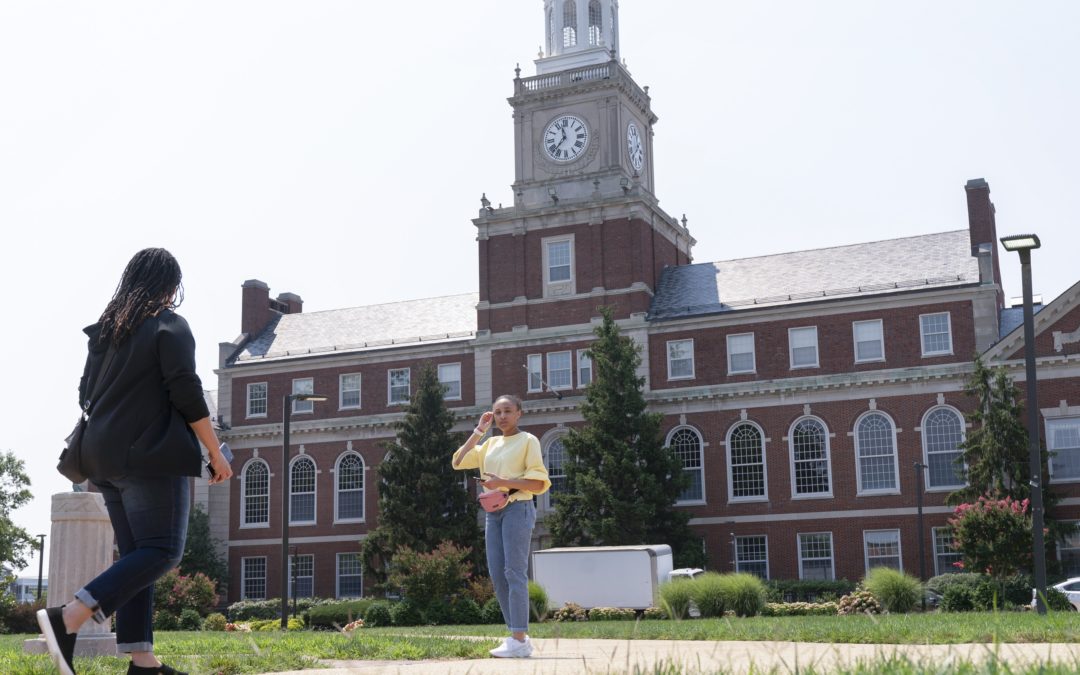
by Ashraf Khalil, AP | Jul 13, 2021 | Black History, Commentary, Headline News |
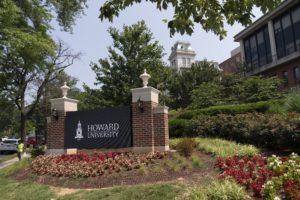
FILE – In this July 6, 2021, file photo, an electronic signboard welcomes people to the Howard University campus in Washington. With the surprise twin hiring of two of the country’s most prominent writers on race, Howard University is positioning itself as one of the primary centers of Black academic thought just as America struggles through a painful crossroads over historic racial injustice. (AP Photo/Jacquelyn Martin, File)
WASHINGTON (AP) — With the surprise twin hiring of two of the country’s most prominent writers on race, Howard University is positioning itself as one of the primary centers of Black academic thought just as America struggles through a painful crossroads over historic racial injustice.
But then, Howard University has never exactly been low-profile.
For more than a century, the predominantly Black institution in the nation’s capital has educated generations of Black political and cultural leaders. Among them: Supreme Court Justice Thurgood Marshall, civil rights icon Stokely Carmichael, Nobel laureate Toni Morrison and Vice President Kamala Harris.
But even by those standards, the school has been on a hot streak lately, with new funding streams, fresh cultural relevancy and high-profile faculty additions. This past week’s hiring of Nikole Hannah-Jones and Ta-Nehisi Coates serves as confirmation that Howard intends to dive neck-deep into America’s divisive racial debate.
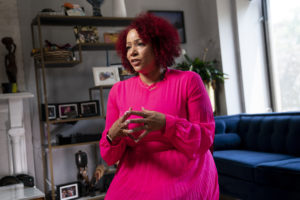
FILE – In this July 6, 2021, file photo Nikole Hannah-Jones is interviewed at her home in the Brooklyn borough of New York. Hannah-Jones opted against teaching at the University of North Carolina after a protracted tenure fight centered on conservative objections to her work and instead chose Howard University, where she will hold the Knight Chair in Race and Journalism. (AP Photo/John Minchillo, File)
Hannah-Jones opted against teaching at the University of North Carolina after a protracted tenure fight centered on conservative objections to her work and instead chose Howard, where she will hold the Knight Chair in Race and Journalism. She rose to fame with The New York Times’ “1619 Project,” which reframed U.S. history through a racial equity lens and helped mainstream the idea of critical race theory — a topic that has become a core Republican talking point.
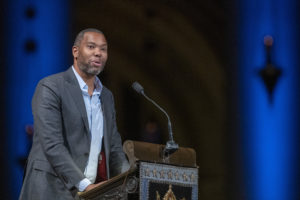
FILE – In this Nov. 21, 2019 file photo, author Ta-Nehisi Coates speaks during the Celebration of the Life of Toni Morrison at the Cathedral of St. John the Divine in New York. This past week’s hiring of Nikole Hannah-Jones and Coates serves as confirmation that Howard University intends to dive neck-deep into America’s divisive racial debate. (AP Photo/Mary Altaffer, File)
Coates has written critically on U.S. race relations for years and is closely associated with the argument for reparations for slavery.
Howard’s president, Wayne Frederick, doesn’t characterize either hiring as overtly political, but merely a natural extension of the university’s motivating ethos.
“Howard University has been on that caravan for social justice for about 154 years,” Frederick said in an interview. “Howard has a rich legacy. … My responsibility is to contemporize that and to bring faculty to the university who are in the contemporary space, speaking to present-day issues.”
Columbia University journalism professor Jelani Cobb, a Howard alumnus, described the moves as a pivotal jump in the university’s national stature. Howard, he said, had gone from traditionally “punching above its weight class” to “moving up a whole division.”
All this is just a few years removed from a period of internal tension and financial scandal. In 2018, six employees were fired amid revelations of more than $350,000 in misappropriated grant funding, and students staged a nine-day occupation of the administration building over demands that included better housing and an end to tuition increases.
But even amid those problems, Howard has seen a boost in applications and enrollment as more Black students choose to attend historically Black colleges and universities. “I do think that we’re seeing a renaissance, and that that’s driven by the students more than the parents,” said Noliwe Rooks, chair of Africana studies at Brown University. Rooks attended Spelman, an all-female HBCU in Atlanta.
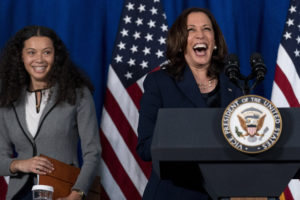
Howard University Student Association President Kylie Burke, left, introduces Vice President Kamala Harris to the podium to speaks about voting rights at Howard University in Washington, Thursday, July 8, 2021. (AP Photo/Andrew Harnik)
Vice President Harris returned to Howard days after the hirings were announced. Speaking at a news conference on a voters’ rights initiative sponsored by the Democratic National Committee, she received a rapturous welcome from a packed house that supplied church-style “amens” and burst into applause when she called Howard “a very important part of why I stand before you at this moment as vice president of the United States of America.”
For current students, the school’s rising profile is a confirmation of their choice to attend “The Mecca” — one of Howard’s many nicknames.
“There’s something truly intangible about this university,” said Kylie Burke, a political science major and president of the Howard Student Association, who introduced Harris at the event. Like Harris, Burke came from Northern California to attend Howard, and she served as a legislative fellow in Harris’ office when she was a senator. “Howard teaches you a thing about grit, it teaches you to remain focused, it teaches you to be persistent,” Burke said.
The hirings capped a dizzying stretch for Howard.
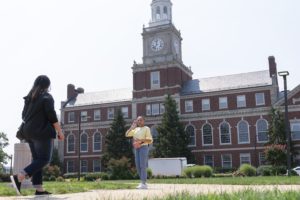
FILE – In this July 6, 2021, file photo with the Founders Library in the background, people walk along the Howard University campus in Washington. With the surprise twin hiring of two of the country’s most prominent writers on race, Howard University is positioning itself as one of the primary centers of Black academic thought just as America struggles through a painful crossroads over historic racial injustice. (AP Photo/Jacquelyn Martin, File)
Within the past year, Harris was elected vice president; MacKenzie Scott, ex-wife of Amazon founder Jeff Bezos, donated $40 million; and actor Phylicia Rashad returned to her alma mater as dean of the newly independent College of Fine Arts. That college will be named after the late Chadwick Boseman, a Howard graduate whose role as African superhero Black Panther made him an instant icon and shined a fresh cultural spotlight on the school.
Boseman expressed his love for the university in a 2018 commencement speech, calling it “a magical place.” He cited one of the school’s more modern nicknames, “Wakanda University,” a reference to the movie’s technologically advanced African utopia.
Although there’s rising interest across the HBCU network, Cobb said Howard will always attract a particular demographic of Black student such as Harris with an interest in politics and governance. The school has produced members of Congress, Cabinet secretaries and mayors. One of Cobb’s undergraduate classmates was Ras Baraka, now mayor of Newark, New Jersey.
Rooks said Hannah-Jones’ move could have ripple effects throughout academia.
Traditionally, Rooks said, Black academics were drawn to predominantly white universities because that’s where the funding and the prestige lay. But Hannah-Jones didn’t just bring her reputation; she also brought nearly $20 million in funding.
“It’s a whole other thing when you become the benefactor,” Rooks said. “We all learn how to behave, how to act, in the presence of power. If you’re the power and it’s your money, you’ve taken a whole racial dynamic off the table.”
Still, Howard’s rising prominence does bring the risk that it will overshadow smaller HBCUs. Rooks said Howard and a handful of other big names such as Morehouse, Spelman and Hampton dominate the headlines and the funding. She said, half-jokingly, that most Black American students couldn’t name more than 12 of the 107 HBCUs in the country.
One possible example of the phenomenon: In 2019, NBA star Steph Curry donated an undisclosed amount to allow Howard to launch Division I men’s and women’s golf teams, and fund them for six years. Curry was raised in North Carolina, home to 10 active HBCUs, and holds no particular connection to Howard.
The HBCU world still boils down to “five or six schools that really attract a lot of attention,” Rooks said, and dozens of others that are “desperate for funding.”
Howard’s recent fortune, she said, is “not necessarily going to raise all the boats.”
___
Associated Press writer Hilary Powell contributed to this report.
___
Follow Khalil on Twitter at www.twitter.com/ashrafkhalil
by Allen Reynolds, UrbanFaith Editor | Apr 18, 2016 | Feature |
Over the past year, there has been a public outcry and protests on college campuses across the nation due to the handling of sexual assault and sexual harassment cases filed by students with their respective institutions.
The most recent survey by the Association of American Universities found that more than 11 percent of college students have experienced nonconsensual sexual contact in their college careers. The same report found that less than half the women surveyed did not even report their sexual assault. The picture is clear, women are survivors of nonconsensual sexual contact at alarming rates on college campuses (and everywhere else), yet do not report or the incidents and do not receive the help and support they deserve.
Recent examples of confronting this system of sexual injustice include the protests on the campus of Howard University in March. I, myself, am a Howard alumnus and was proud of my fellow Bison as current students stood in solidarity with a survivor of sexual assault. This was a result of what was perceived as an unsatisfactory response by university administration in dealing with the real issues.
Yes, it is true that the university must follow due process because of the possibility of false accusations, which also happens. But with the number of cases that are, in fact, valid, it is good to see students speaking out against these issues and standing in solidarity against the institutional and cultural dynamics that have not yet dismantled our rape culture in the United States, especially on college campuses.

Like many of my peers, I also have personal stake in fighting against rape culture. I, personally, know too many women who have been victims of sexual harassment, assault, and rape.
One particular case is etched in my mind as I remember the fury I felt when I learned that one of my close friends at Howard had been raped. “How could a man do something like that?” I asked myself. My friend felt guilty that it happened. There was a sense of guilt for putting herself in that position, defiled and sinful for something that was never her fault.
It is never a survivor’s fault that they are assaulted. She didn’t report it because she didn’t think it was “worth it” and didn’t want to “be responsible for another black man in prison.”
There are several scriptures that address sexual violence in the Bible, but the rape of Tamar in 2 Samuel 13 captures these emotions and their aftermath best in my view. The lust, misogyny, anger, denial, guilt, depression, lack of fulfillment, and self-hatred and shame of the rapist, the stigma, the sorrow of the survivor, Tamar, are all found in scripture.
The anger of the aftermath and how it impacts people so far beyond the parties directly involved are also found there in those verses. It is illuminating that the aggressor, the victim, and their families experience psychological, social, and spiritual pain from the event, even in scripture.
Jesus stood on the side of those who were survivors of oppression, violence, and sexual devaluation. So, it is also safe to say that He would stand against rape as well.
As men, we must stand with our sisters against patriarchal, oppressive structures and influences. We must stand with them in the midst of the pain. We must, as Christians, stand and speak against sexual violence in all of its forms, against men and women.
We must stand for God’s Kingdom Culture influenced by love and justice against the rape culture that covers our country. We saw a step toward that on Howard’s campus in March and on other campuses nationwide last year. We have to keep walking toward justice and true love. We must break the silence about sexual violence.
Watch for more details on the Howard University protests below:
What are your thoughts on the recent campus protests against sexual violence? Share them below.
What are your thoughts on the recent protests? Share them below.
by Jelani Greenidge, Urban Faith Contributing Writer | Nov 22, 2011 | Entertainment, Feature, Jelani Greenidge |

BLUES SINGERS: Until their departure last night, Howard University's Afro-Blue turned heads with their tight, melodic sounds on NBC's "The Sing-Off."
“In everything give thanks for this is the will of God in Christ Jesus concerning you.”
1 Thessalonians 5:18 (KJV)
In everything.
Really.
Everything.
As I reflect on this Thanksgiving holiday, I can’t avoid thinking about many of the difficult things I’ve endured in the last 12 months.
Five months ago, I lost a part-time job in church ministry, a job in which I learned a lot, grew a lot, made a lot of great relationships, and felt a such a keen sense of calling and belonging that it became a core part of my identity.
Less than a week ago, I lost another part-time job in public speaking, a job in which I learned a lot, grew a lot, made a lot of great relationships, and felt such a keen sense of calling and belonging that it became a core part of my identity.
In both cases, I was immediately aware of some of the logistical benefits of freeing that time up to pursue other things, but that knowledge did nothing to blunt the sting of loss.
Losing those jobs hurt, and hurt bad.
Times like these, I have a hard time giving thanks.
Until, that is, I remember that many of the things I’m currently thankful for now — areas of success or blessing or peaceful satisfaction … these things have all been intimately intertwined with events and seasons of crushing pain and humbling defeat.
Struggles embattled give way to humility embraced, which leads to victory empowered.
Because this is beginning to sound a bit too much like a motivational poster, let me give you an example.
While I was on staff at my last church, I developed a technique to leading worship music that helped to compensate for a lack of a consistent band. It involved creating and replaying accompaniment tracks in the form of patterns, which helped me with all of my multitasking (leading vocals, leading the band, directing the singers, et cetera). I got pretty good at it, and when I realized that there were no existing resources to help others do the same thing, I decided to start one.
This was a pivotal decision for me, because it represented a strategic convergence of so many of my interests. Beginning this work, I felt as though I’d finally identified my calling from God. I was excited, motivated, and full of vision.
The irony of the situation, however, was that despite the fact that the genesis of my idea flowed out of my passion for multicultural corporate worship music, the logistical and emotional demands of my church job were such that I was unable to make much headway on my idea. So being asked to resign was, while difficult and painful, quite beneficial to the long-term success of my entrepreneurial ministry venture. It was, in many ways, the best-case scenario — despite the fact that it felt like my world was coming to an end.
Struggles embattled, humility embraced, victory empowered.
This is a lesson that all successful people have to embrace at some point, whether it’s Conan O’Brien getting kicked off The Tonight Show, or Afro-Blue being booted off The Sing Off.
And believe me, I was among the legion of fans shocked and offended by that last outcome, reading Ben Folds‘ explanation did little to assuage my anger. That Conan thing was sad and ridiculous, but this Afro-Blue thing feels like a travesty.
Yet, as I look back on that whole Tonight Show brouhaha, I can tell that Conan has become better for it. Conan himself was able to articulate this painful-yet-positive dynamic when he said the following:
There are few things more liberating in this life than having your worst fear realized.… it’s not easy, but if you accept your misfortune and handle it right, your perceived failure can become a catalyst for profound reinvention.
My man Coco said these words last June during his commencement speech at Dartmouth College, an ironic note since Afro-Blue was eliminated from The Sing-Off in favor of The Dartmouth Aires, the Ivy League show choir from Hanover. And I have no doubt that the men and women of Afro-Blue, the pride of Howard University and DC’s finest, will continue to exhibit the poise, heart and talent that propelled them to their fourth-place showing on the megahit NBC a cappella singing competition.
I’m hopeful, of course, and not just for the obvious reason that all of the singers in Afro-Blue still have a tremendous future in music ahead of them (especially lead vocalist Danielle Withers).
I’m hopeful because, in the grand scheme of things, God can and does use all things to take his children and mold them into the people that He wants and calls them to be. And the extent to which we become more like Him is the extent to which we submit to His will, which sometimes requires profound heartbreak.
So in the meantime, I will have to resign myself to replaying Afro-Blue’s cover of “Put Your Records On” over and over, because … wow, that is my jam right now.
And for this, as for so many other things in life, good and bad, I will do what Paul charged the church in Thessalonica to do.
I will give thanks.
by Christine A. Scheller | Jun 7, 2011 | Feature |
 In a recent Wall Street Journal review of Baylor University sociologist Byron R. Johnson‘s new book, More God, Less Crime: Why Faith Matters and How It Could Matter More, James Q. Wilson questions Johnson’s assertion that religion reduces crime.
In a recent Wall Street Journal review of Baylor University sociologist Byron R. Johnson‘s new book, More God, Less Crime: Why Faith Matters and How It Could Matter More, James Q. Wilson questions Johnson’s assertion that religion reduces crime.
Johnson looked at every study conducted between 1944 and 2010 that measured the possible effect of religion on crime. In 273 such studies, he found that “even though their authors used different methods and assessed different groups of people, 90% of these studies found that more religiosity resulted in less crime,” writes Wilson, who then assesses what he alleges are the weaknesses of Johnson’s approach. The key weakness he identifies is the lack of control groups in the cited studies. Nonetheless, Wilson concedes that the sheer number of studies show “a religious effect.”
Dr. Harold Dean Trulear is an associate professor of applied theology at Howard University’s School of Divinity, as well as the director of the Healing Communities Prison Ministry and Reentry Project in Philadelphia. He’s also a longtime colleague of Johnson’s. In an email response to UrbanFaith, Trulear said he thinks the Wall Street Journal review is “honest and fair.” He added that, as a fellow social scientist, he has “found it best to … use data to be suggestive, but not conclusive.”
“I use Johnson’s work, my own research in religion and social behavior, and the work of others to point academics, researchers, and policy makers toward religion and religious institutions as valuable contributors to our common good. But I always stop short of saying ‘religion works,’ precisely because it is God — not human religious activity — that has true efficacy,” Trulear wrote.
“As a person of faith, my ultimate allegiance is to Christ and His Kingdom, and my sociological training is but a tool for His use. That said, I do not rely on sociology to ‘prove’ the effectiveness of religion or Christianity,” he added. “The whole idea of Christian ‘proofs’ is a late phenomenon in Christian history, coinciding with the scientific age, and the faith’s unfortunate sense that it needed to be scientific to have validity. I use social science to point in the direction of religion’s efficacy concering crime reduction, but strict cause-and-effect language is inconsistent with Christian faith, whether in social science or in prosperity ‘name it and claim it’ theology.”
Wilson’s review mentions Prison Fellowship as the largest effort to increase the religiosity of “convicted offenders.” The Christian organization utilizes a three-stage approach that includes Bible study, community service, and commitment to a church and mentors upon release.
 “Johnson looked at the program’s effectiveness in Texas and found that those who completed all three phases were much less likely to be arrested or incarcerated for a new crime than those who dropped out. The key question is whether the inmates who go through all three phases differ in other ways from those who never join the program or drop out early,” writes Wilson. He concludes that in an earlier study Johnson found “no difference between Fellowship and non-Fellowship groups over an eight-year period except for those members of the program who worked hard at Bible studies” and then “the effect lasted for only two or three years after prisoners’ release.”
“Johnson looked at the program’s effectiveness in Texas and found that those who completed all three phases were much less likely to be arrested or incarcerated for a new crime than those who dropped out. The key question is whether the inmates who go through all three phases differ in other ways from those who never join the program or drop out early,” writes Wilson. He concludes that in an earlier study Johnson found “no difference between Fellowship and non-Fellowship groups over an eight-year period except for those members of the program who worked hard at Bible studies” and then “the effect lasted for only two or three years after prisoners’ release.”
Prison Fellowship founder Chuck Colson responded to Wilson’s review in a Breakpoint commentary that praised Johnson’s work.
“What Johnson’s book More God, Less Crime shows so clearly, is that we’ve been right all along: The Gospel changes lives, and it’s the best hope for keeping men and women out of prison,” wrote Colson.
But Trulear would temper any enthusiasm about the book with this caution: “As valuable as Johnson’s work is — and it is extremely valuable in pointing us to religious institutions and behavior as available loci in the fight against crime — people of faith must remember that their ultimate allegiance is not to what works, but to what is best and right. The answers to these two questions will not always coincide.”










